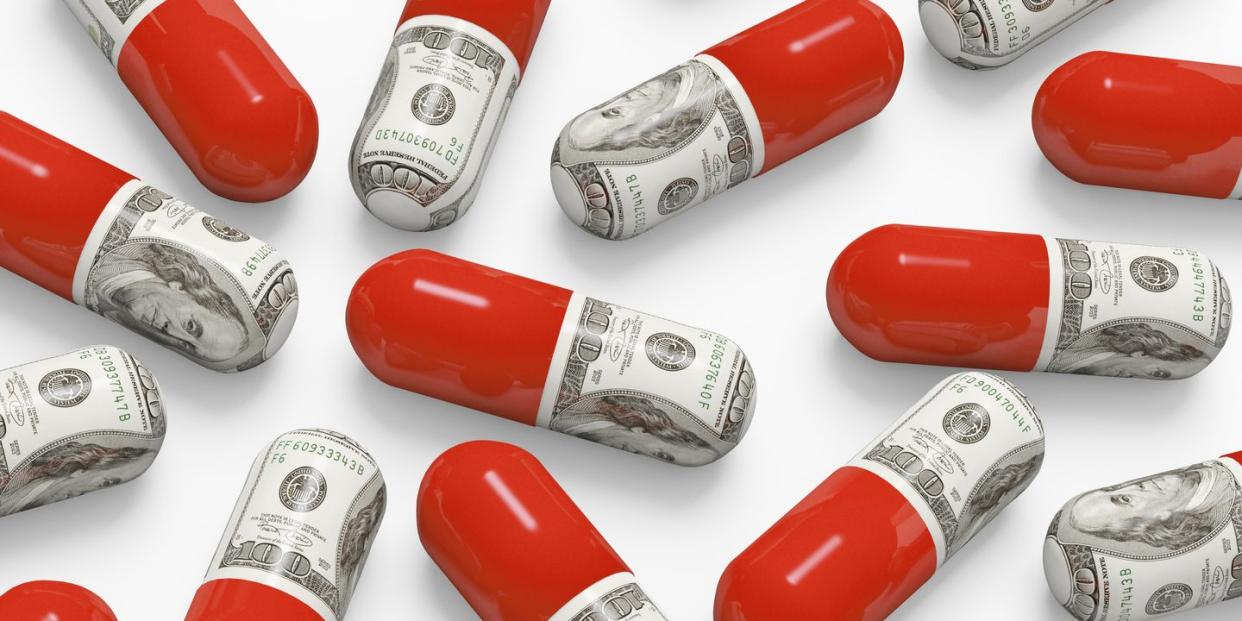The Democrats' Deal Only Targets One Piece of Our Drug-Pricing Problem

- Oops!Something went wrong.Please try again later.
Last week, Senate Majority Leader Chuck Schumer and Pesky 49th Vote Joe Manchin announced they’d reached a deal on a budget reconciliation bill. The provisions included a new minimum corporate tax, new funding for the IRS, closure of some tax loopholes, and new spending on climate priorities and energy production. Some of the money raised will also go toward shrinking the budget deficit. But the framework also gets into healthcare, with an extension of Obamacare subsidies to keep insurance premiums down and a provision that seeks to tackle America’s extraordinarily high prescription drug prices.
What are these pharmaceutical provisions, and what difference will they make for The Everyday American? Where does all this fit in the rocky landscape of the American healthcare? We called up Karen Van Nuys, who studies prescription costs and pharmaceutical distribution chains at the USC Schaeffer Center, to find out. Our conversation has been edited for length and clarity.
This is just a framework, and the devil’s in the details as they hash out the legislation, but what are your first impressions looking at these drug pricing provisions?
Is this going to lower costs for patients? And the current legislation, Medicare negotiating drug prices—I mean, first of all, what's currently in the bill is 10 drugs in 2026, the first year. Then ramping up to 15, and maybe 20 a little later. So it's a relatively limited part of the drug spectrum that we're talking about here, but they're important drugs. They're chosen because they're going to be high-spend drugs, so a lot of people are going to use them.
But when Medicare negotiates lower prices on those drugs, there's no real reason to expect Medicare patients to see that in what they pay. It's really going to land on the plans themselves. The patient copay may not change at all. The savings will accrue to the folks who are financing those purchases, which are the health plans and Medicare itself—taxpayers, basically. And so it's going to hit the overall cost of drugs, but whether or not it actually hits the patient's pocketbook remains to be seen.
There is a provision in the current legislation, which is to cap Medicare patients’ out-of-pocket expenditures at $2,000 [beginning in 2025]. Anybody who's currently spending more than $2,000 out of pocket will see savings through that provision. But through the actual negotiation of drug prices? Maybe, maybe not—hard to say.
So there’s not much reason to expect somebody who's not Medicare-eligible to see any change in their day-to-day finances related to drug pricing?
Yes and no. What Medicare does oftentimes has a trickle-down effect into private plans. And Medicare coverage has a tendency to influence what sorts of things are covered in private plans.
Is it that Medicare is such a big player in the market, it represents so many patients?
Yeah, in a somewhat different dimension, though, than I think you're thinking about right now. For a lot of drugs that are on the market, the Medicare population is the vast majority of the demand for those drugs. And so it matters tremendously for things like medications for heart failure, for example, which are taken disproportionately by people who are on Medicare. And so the revenues, even though this legislation only applies to Medicare, that’s a hugely important kind of customer, if you will, for a lot of these drugs. Older people take more drugs than younger people do.
So the influence is really through what that reduced revenue—right, because we're going to lower the prices of a bunch of these drugs—what that’s going to do to manufacturers and then to drug development going forward. There will be less revenue coming in to finance R&D and all of the other things that drug manufacturers do, but importantly, R&D for future drugs.
When manufacturers are planning their development investments going forward, they're thinking about 15 years from now, or 20 years from now, when this drug actually hits the market, ‘What are my revenues likely to be?’ And this legislation will have an important impact on those calculations, right? If, in the future, when my drug comes to market, it's then going to get price-capped by this legislation, I shouldn't expect to make the kind of returns on this investment that I might otherwise have expected. And then that makes the investment less attractive. Maybe I don't invest in these drugs. So it has a spillover effect onto non-Medicare populations in terms of its impact on future drug development and future drug innovation.

Is there a way to reconcile the goal of lowering drug costs with what you're describing, the profit motive involved in developing new drugs?
A lot of the research that I've been working on with my colleagues here at the Schaeffer Center for the last five or six years have to do with drug costs, but not just drug costs from the manufacturer. Also including all of the costs that are layered onto drugs as they go through the distribution system.
So for example, we did a study last fall on insulin. It turns out that more than half of what we spend on insulin goes to those intermediaries. The manufacturer takes home less than half of what we're spending on insulin. So the manufacturer has that money to think about future innovation and R&D, so on and so forth. The whole rest of it—more than half—is going to pharmacies and pharmacy benefit managers and the health plans and the wholesalers.
That money has nothing to do with innovation. Nobody in the distribution system does any drug development. So if you're going to take a pie and split it in half and then try and get savings out of one half or the other, but the money you take away from one half is actually going to put a damper on future innovation, whereas the same money taken out of the other half won't…There's money in both sides of the pie. But some of that money is going to development activity, and some of that money is just going to enrich shareholders. And I would rather see legislation that goes after the stuff that isn't used to innovate. That's my personal bias.
It seems like a wider problem in the U.S. healthcare system, where all across it there are these middlemen where it’s not clear why they’re important to the system.
They've made themselves very important to the system, I think. It's a little bit like if you had a clean sheet and could start from scratch, you certainly would not design it this way. But now that we're here, it's very complex to unwind.
And oh, by the way, it's not just medicine. There are middlemen in the meatpacking industry. They're doing something similar to meat. Farmers aren't getting [much], but the meatpackers are getting all this money.
Right, it’s corporate consolidation among the meatpackers, where they can squeeze both the cattle ranchers and the consumer at the supermarket.
That's exactly the same thing as pharmacy benefit managers [Note: Also known as PBMs, these companies manage prescription drug benefits on behalf of health insurance plans, employers and other groups. These firms argue that they provide services and use their information advantage to lower prices]. The top three pharmacy benefit managers control 80 percent of the prescriptions we write. So it's consolidation in that [supply] chain as well. It's the same dynamic, it's just a different industry.
How do you deal with these players?
We’ve been working at this for six years or so, but it finally feels like there’s some movement in Washington around pharmacy benefit managers and recognizing the role of the distribution system and the intermediaries and raising costs. The Federal Trade Commission announced that they're going to open a huge investigation into the largest pharmacy benefit managers. And there's been some legislation proposed. I think it's on the back burner right now, just because so much of what's happening in Washington right now is about this particular [reconciliation] bill, but Maria Cantwell and Chuck Grassley proposed some legislation, looking at pharmacy benefit managers and imposing some transparency requirements on them.
That sounds like some of the proposed fixes to meatpacking, in that—I think it was actually Grassley again—who wants to create more transparency in the cattle pricing structure. Because right now I think it's very opaque for cattle ranchers.
Yeah, I think it's the same market dynamic happening, although I can't imagine a more complicated market than the drug market right now.
There are segments of the market where we're starting to see individual private actors just opting out. In the case of Mark Cuban['s CostPlus drug initiative] and some of these other disruptors focusing on generic drugs where there's no patent issue, there are multiple manufacturers for identical products. And Mark Cuban has started a company, not for profit, where he's providing these generic drugs, basically at their acquisition cost plus a small dispensing fee plus shipping. It’s a mail-order pharmacy, and they have been successful in lowering the prices of all of these generic molecules.
The catch is you can't use your insurance to buy them. You have to pay cash, but many, many customers are finding that they can pay cash for the whole boat. There's a pharmacy in Pennsylvania called Blueberry Pharmacy that's doing the same thing. You pay cash for the whole boat, and it costs less than what your copay or co-insurance would be if you ran it through the system of intermediaries that is the insurance system.
That sounds like a broken market.
But this is the fix, right? It’s basically creating a cash market for these products. We did a paper last summer where we looked at the top 200 generic drugs that Medicare buys. And then we compared what Medicare paid for each claim against what that prescription could have been filled for at Costco, for cash. We found that Medicare was overpaying on just these 200 drugs by over $2 billion a year. Something like 43 percent of the prescriptions that Medicare was filling, there was an overpayment relative to what they could have been purchased for at Costco, and an average overpayment of like 20 percent per script.
Sort of bypassing this whole supply chain.
Completely, yeah. You can't do that for branded drugs where the manufacturer has a monopoly: There's nobody to compete the price down. But with generics, in many cases there are 20 different manufacturers making the same molecule. So you get a lot of price competition in those markets.
What else am I missing about this landscape?
We have lots of research and anecdotal evidence that shows that when manufacturers do lower their prices, that intermediary chain is really good at absorbing those discounts rather than passing them through to patients or to payers. And so we see this in the insulin market, where manufacturers have lowered their prices by 33 percent over a five-year period. And yet the price of insulin has basically not changed. What's happening is that the intermediaries are just sucking up that discount.
And so the flag that raises for me with the current legislation is: Okay, now Medicare is going to negotiate with manufacturers to get lower prices out of manufacturers. Let's make sure that doesn't just get sucked up by the intermediaries. Let's make sure it gets passed through to taxpayers. That it's not just going to then enrich the shareholders of the intermediaries. And there's nothing in this legislation that ensures that.
You Might Also Like

